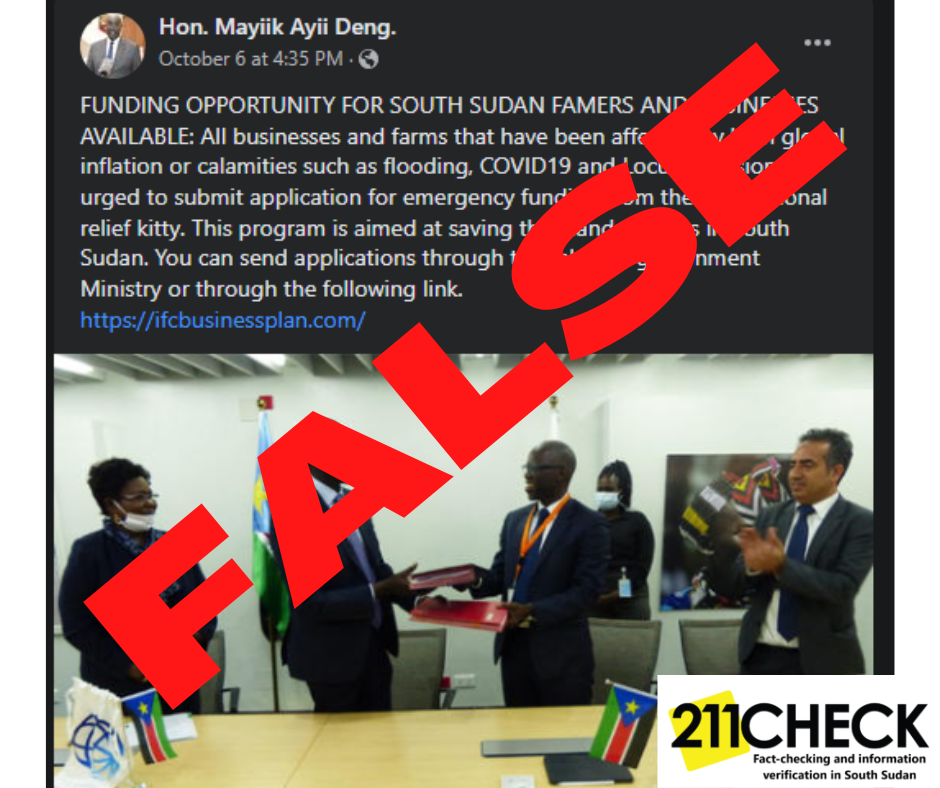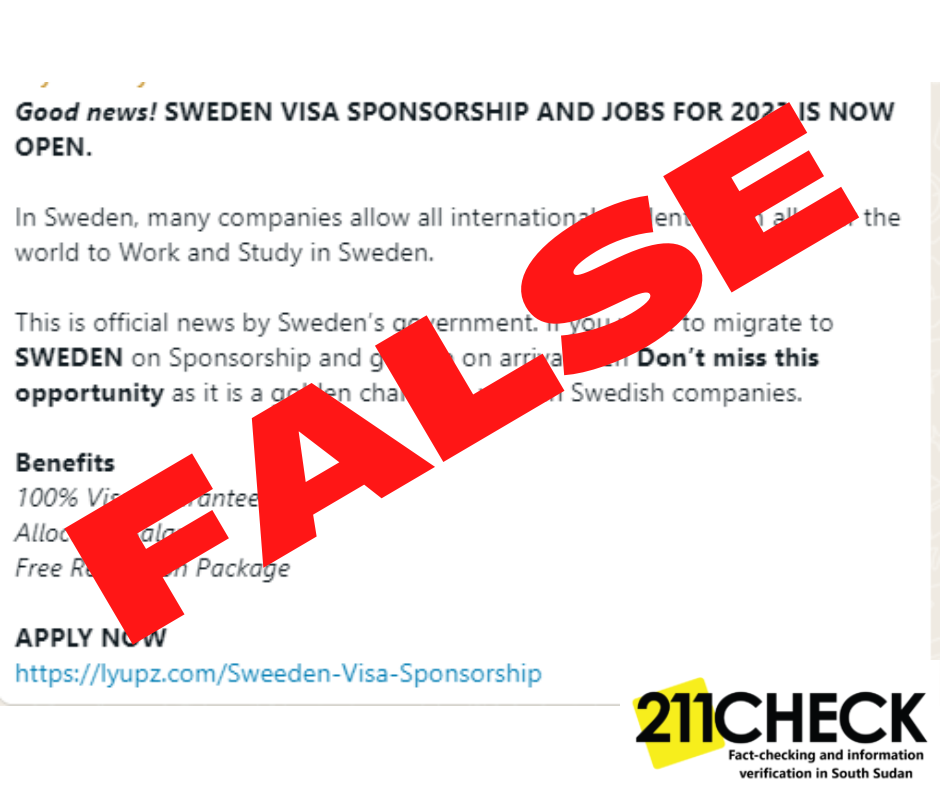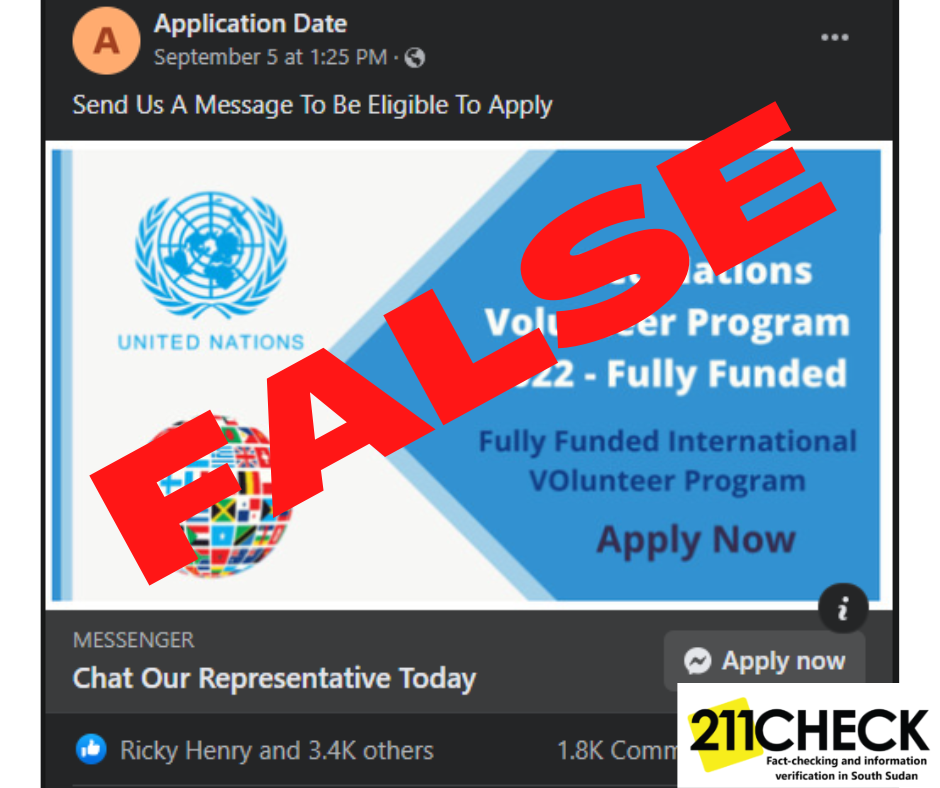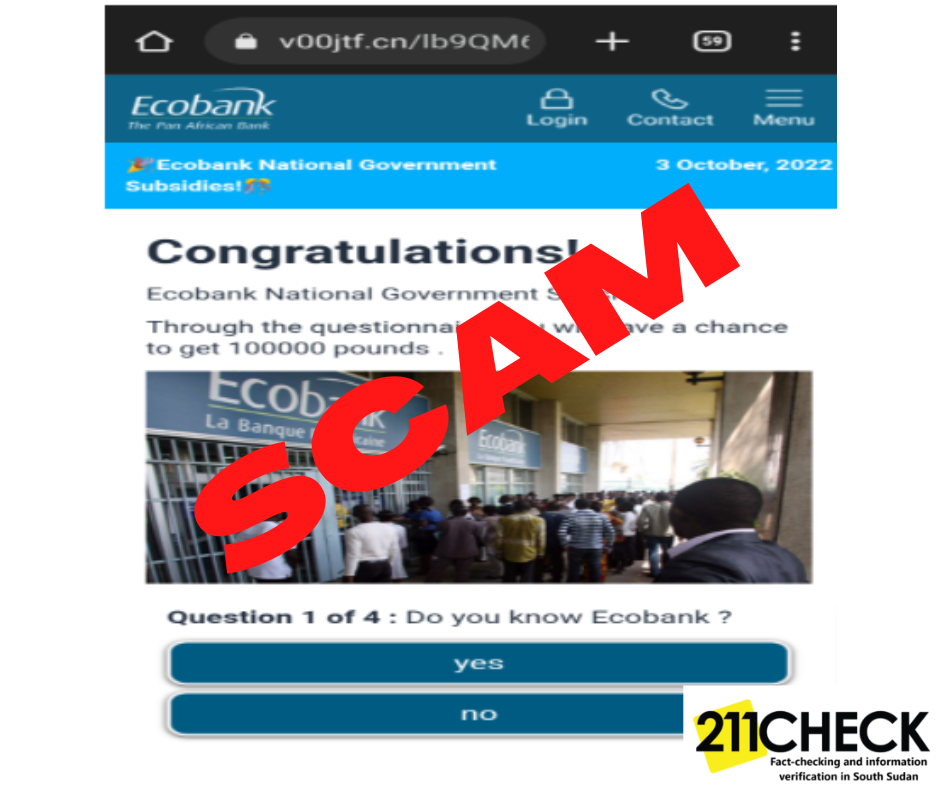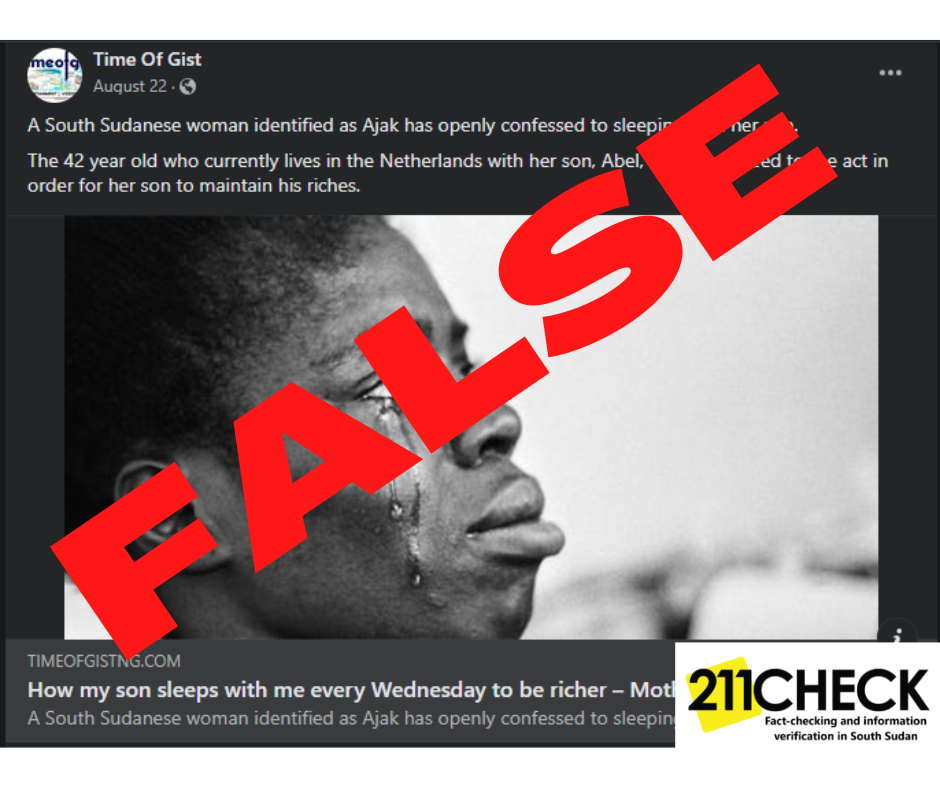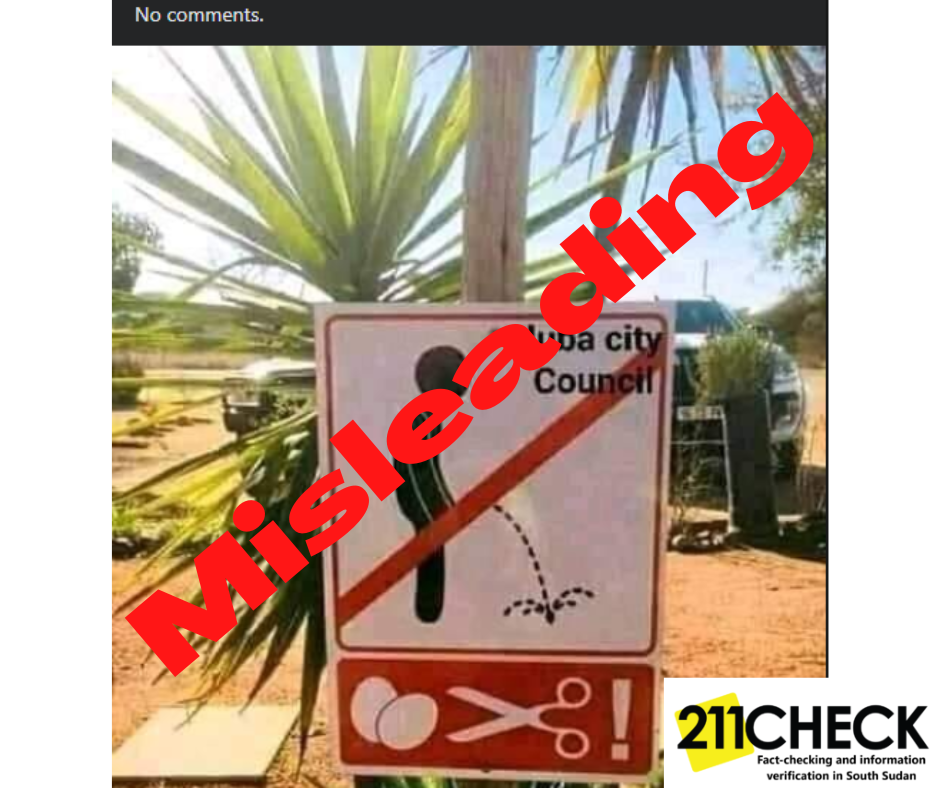Silicone Valley Shares: A trail of red flags as South Sudanese investors cry foul over lost cash
South Sudanese who sunk their hard-earned money into a “US venture capital firm” promising mouthwatering returns are worried. They have reason to be – there are many signs that not all was what it seems to be.
Writer: Emmanuel Bida Thomas
One cannot miss the frustration and mounting worry among those who invested in Silicone Valley Shares, which claims to be a US-headquartered venture capital firm with more than $6.4 billion in assets under management.
“In developed countries cases of fraud are treated as criminal cases but in South Sudan we are used to suffering and have to endure this big scam,” Ezekiel Matiop, an investor, told 211 Check.
He had lost US$3,400 he said, and had already written it off, even as he called for those responsible to be punished. “The good thing is that it has taught us a great life lesson”.
Caesar Lemmy told 211 Check he had lost $1,542. “My experience is so bad, I wish I didn’t take the initiative of investing my hard earned money there, the company’s problems keep on increasing every day, I am not sure if they will ever operate again.”
Several other investors interviewed by South Sudan broadcaster Eye Radio in late September 2022 also spoke of their concerns they had lost their money. One said they had invested $4,100, and that he was in a WhatsApp group of hundreds of other investors – and they could be more.
Venture capitalists provide financing or other investment to startup companies and small businesses, trading the risk for the hope of handsome returns. But it is not clear what exactly Silicone Valley Shares’ model was.
Public records seen by 211 Check and also shared on social media show Silicone Valley Shares was registered in South Sudan by the justice ministry in December 2021 as “Silicone Valley South Sudan Co. Limited.”
But the company, which promised outsized profits, has run into major headwinds in the country. Its website was suspended in early September before being restored. Its offices were subsequently closed by security services and investors reportedly stormed its office in the capital Juba due to their inability to withdraw their funds.
Lemmy said he had tried to withdraw his money unsuccessfully. “I tried after they restored the website, but the money was never deposited into my account, and most people are also complaining about the same,” he said.
The company has kept a low profile, save for a man who claimed to be an executive saying its Juba staff had been detained. In an interesting twist, the staff in question denied this as “baseless”.
A more recent body blow was an order to local banks by the central bank to freeze its accounts.
As the debate – and distress – rages, 211 Check took a longer look under the hood and identified several red flags.
We have asked the firm to comment on our findings, but they are yet to respond at the time of publication.
Firm claims to have invested – in companies older than itself
The firm’s name is clearly meant to identify it with the Silicon Valley region, an area in the US known for incubating and housing a large number of technology and software companies.
Silicone Valley Shares claims to have “helped launch and commercialise 200-plus companies since 2010, including investments in “DocuSign, Jet.com, Kiva Systems, LinkedIn, Rapid7, SurveyMonkey, Taleo, and TellApart.
These companies did not immediately comment on whether Silicone Valley Shares was an early backer when 211 Check contacted them through email.
But DocuSign, Kiva Systems and LinkedIn were all founded in 2003, well before 2010, the year Silicone Valley Shares claims it was established.
Its website domain history is inconsistent with its supposed founding date. A domain record gives information about a website, including who it is registered to and when the site was first registered.
A search of Silicone Valley’s record on Whois and Domain Age Checker, two popular domain tools, shows 29 October 2021 as the date on which the website was created. It is however possible it existed in a different form before then.
Screenshot of the Whois Record for siliconevalleyshares.com
A search on Cloaking Checker, a tool which checks if a website is trying to fool search engines so as to get a better ranking, reported a “possible cloaking attempt”.
Stock images and phantom management
Archived versions of the Silicone Valley Shares website, captured between 21 December 2021 and 30 August 2022 on the Internet Archive’s Wayback Machine, list the following “expert management team”:
- chief executive officer Zhirong Jeffrey
- director of IT and innovations Lew Son
- director of sales, marketing and business development Jenifer Sting
- finance and accounting director Alex Joe
However, reverse image searches – a way of tracking down the usage history of a photo – on their profile pictures show markedly different details. Lew Son seems to be Johan Dennelind, a Swedish businessman and current board chair of KCOM, one of the longest-established providers of communications services in the UK.
Jenifer Sting appears to be Jen Leary, the chief executive officer of US accounting and consulting firm Clifton Larson Allen LLP. Alex Joe is Johan Thijs, a Belgian and the chief executive of KBC Group, a Belgian financial services group. Rather strikingly for a CEO, Zhirong Jeffrey has no digital footprint.
Our efforts to contact the real people through LinkedIn and their current companies were unsuccessful at the time of publishing.
Screenshot of what Silicone Valley Shares claims to be its team of experts captured on 24/12/2021
The “management” team’s profiles were removed in later versions of the website, but the site still features testimonials from three supposedly satisfied clients.
The testimonials are allegedly from Arjun Thankar, Racheal Davis and Adebola Ogundipe, from India, the US and Nigeria respectively.
Screenshot of alleged user comments on the Silicone Valley Shares website
But reverse image searches show that the photos of Thankur and Davis are stock images – widely available photographs anyone can use either for free or for a fee instead of commissioning a photographer.
That of Ogundipe is actually of Ernest Ojeh, a Netherlands-based Nigerian user experience designer.
Contacted via LinkedIn, Ojeh told 211 Check he had never heard of the company.
“I am shocked to see this. I have no idea who runs Silicone Valley Shares and why they have used my picture on their site. I have never heard of them before,” he said.
US records come up empty
Silicone Valley Shares claims to be a limited liability company (LLC) headquartered in San Jose, California in the US. According to the California Corporations Code, a limited liability company is required to file articles of organisation with the California Secretary of State.
Information on any corporation or business entity in the United States is usually obtained by performing a search on the Secretary of State website of the state or territory where that corporation is registered.
The California Business Registry office directed 211 Check to its public portal for “entities made of record with the California Secretary of State’s office”.
A search on the portal returned no results for a limited liability company named Silicone Valley Shares.
Screenshot of search results for entities made of a record with the California Secretary of State
The company’s listed phone numbers and addresses also don’t seem to match.
On its website Silicone Valley Shares claims that its office address is City View Plaza 100 W San Fernando St #320, Downtown San Jose, CA 95113, USA. However, the address’s street view shows a street and a building that appears to be a residential apartment.
When one searches for “Silicone Valley Shares LLC” on Google maps, the result returns the location 320 San Jose Avenue, San Francisco, CA 94110, United States, and not City View Plaza 100 W San Fernando St #320, Downtown San Jose, CA 95113, USA.
This inconsistency is unlikely in an established company anywhere in the world, let alone with hundreds of billions of dollars.
Manipulated images of alleged “Silicone Valley Shares LLC” offices and events on Google Maps
Further, the uploaded images of the San Jose Avenue address also appear to be either stock photos or images that have often been clearly edited.
A reverse phone lookup also showed that the area codes of the company’s two listed phone numbers are for the states of Ohio and Nevada , not California, where San Jose is located.
mGurush denies knowing Silicone Valley Shares
There are still more inconsistencies. In this blog post on its website, Silicone Valley Shares states that its clients will access its services using m-Gurush, a mobile money platform popular in South Sudan.
However, mGurush on social media said it was unaware of Silicone Valley Shares and that they were not in a partnership.
Screenshot of tweet reply from m-Gurush
A Ponzi or pyramid scheme?
M-Gurush requires users to register, deposit and withdraw cash through an agent. But investors in Silicone Valley Shares reported a different method.
“There’s what they called float, so you give cash to someone who has float, and he sends you the float, then you can invest that float,” Matiop told 211 Check.
A typical contract can be seen here. Investors are also paid their interests through bank deposits or in cryptocurrency.
Silicone Valley Shares has a referral programme which claims that when your friends or new investors you bring into the business click on a website link and make an investment, you are credited with a particular percentage commission of their investment amount.
An investor can commission up to a certain level, which is how pyramid schemes work. In this case one can commission up to a fourth level.
Screenshot of Silicone Valley Shares referral programme
Pain at the bank
On 23 September 2022, the Central Bank of South Sudan directed all commercial banks in the country to block and freeze all accounts of Silicone Valley South Sudan Co. Limited.
Letter from the Bank of South Sudan directing commercial banks to freeze accounts of the company
Banks have started complying. The Equity Bank of South Sudan told 211 Check “it had already blocked the account of Silicone Valley when the rumours about their business came out”.
Another bank, Ecobank, told the Voice of America’s South Sudan in Focus programme that it would close the company’s account in keeping with the regulator’s order.
Experts poke holes in firm’s model
211 Check asked finance and technology experts about the company. Silicone Valley Shares promises investors profits of between 350% and 876% for investments of a minimum $50 and a maximum $100,000. This is calculated hourly.
David Marko is a software engineer at the Juba-based Nilotech firm. He said no investment or financial technology firm accrues hourly interest for their investors while consistently claiming to be immune to the risk, or operates with aggressive multi-level marketing, forcing their clients to keep onboarding people.
“A scam is usually apparent when a company tries to sell the most complicated asset or idea to the least educated customers. They claim investments for customers in US stock markets to a customer base from a country that doesn’t have a local Securities Exchange,” Marko said.
“If it sounded too good to be true, it is because it is,” he said. He highlighted “better alternatives” for South Sudan’s rising middle class such as savings and credit corporations (Saccos) and microfinance companies.
Marko has also made a thread on Twitter about his reservations.
Deng Akoi Arok is a financial technology (fintech) entrepreneur in South Sudan’s capital Juba. He said fintech is the use of technology to improve delivery of financial services mostly through a user interface (UI).
“While Silicon Valley Shares provided a dashboard, its returns were not verifiable because no one knew their product. It’s been labelled as a cryptocurrency company but does not fit any known crypto business model,” Arok told 211 Check.
Wani Steven, a technology lawyer at Witness Law Advocates in Juba, told 211 Check that the lack of proper means by how the company’s money multiplies “ is a serious threat and should be investigated”.
Firm’s registration missed the mark – lawyer
The police headquarters in Juba have told aggrieved investors to open cases as Silicone Valley Shares is registered in South Sudan.
Spokesperson Maj Gen Daniel Justin reportedly said documents the law enforcement agency had obtained supported this.
The documents have been doing the rounds on social media and include a certificate of incorporation from the justice ministry and a letter of “no objection” from the interior ministry.
But the technology lawyer Steven told 211 Check that these were not enough.
“My view is that Silicone Valley has not complied with all the laws regulating the type of business they were engaging in.
Incorporating a general trading company, and acquiring letters of no objections and approval to acquire stamps from the police, is not sufficient for the type of business they were doing.”
Steven said that as a platform that conducts online services,which includes engaging in share trade,) they should have obtained a licence from the NCA.
They should also have gotten a licence from the central bank “which generally regulates any business that engages in money lending or similar engagement to what Silicone Valley was doing”.
In its letter to banks, the central bank of South Sudan said it froze the company’s shares because it is “still under investigation on issues related to compliance with all the relevant laws of South Sudan”.
Conclusion: Caution is the name of the game when investing
All available evidence indicates that Silicone Valley Shares is not a registered LLC in California, as it claims to be. The company’s name is not in the California Secretary of State’s Office’s business database. Its website address does not correspond to the address on Google maps, and its phone area code does not match San Jose, California, where it claims to be based.
On its website and Google Maps, the company uses a mix of stock images, manipulated images, and photos of seemingly arbitrary individuals, which is unusual for a legal entity.
This report by 211 Check was written as part of the 2022 Africa Check fellowship programme. The programme is one of many ways in which Africa Check fosters the practice of fact-checking across the continent.

